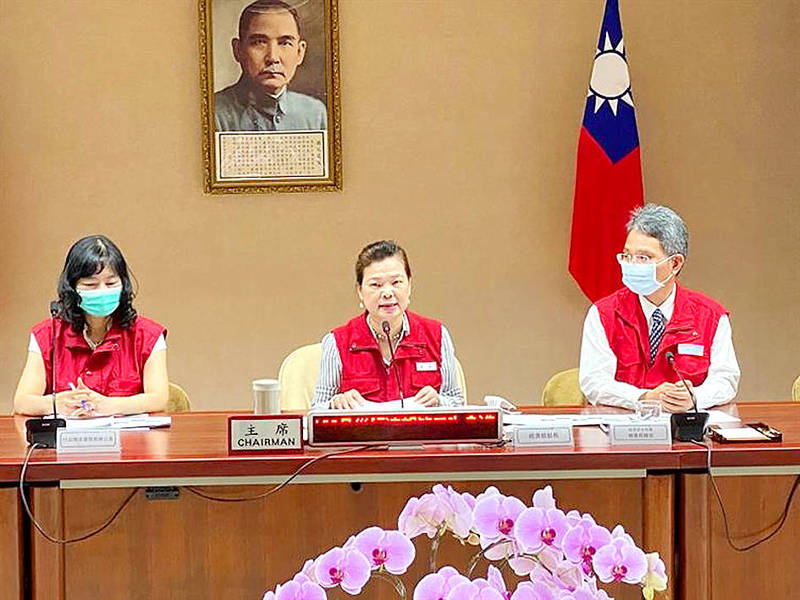《TAIPEI TIMES》Taiwan facing ‘difficult’ dry season: minister

Minister of Economic Affairs Wang Mei-hua, center, presides over an interdepartmental meeting to discuss water restrictions in Taipei yesterday. Photo courtesy of the Ministry of Economic Affairs
LA NINA EFFECT: Rainfall is forecast to be average for the rest of this year, but is likely to be low in the first three months of next year compared with previous years
By Angelica Oung / Staff reporter
Taiwan might be facing a “historically difficult” dry season this year, Minister of Economic Affairs Wang Mei-hua (王美花) told an interdepartmental meeting yesterday, calling on government agencies to “plan for the worst.”
“This is the first time since 1964 that a typhoon has not hit Taiwan for a whole year, leading to very low precipitation,” Wang said. “We will have to figure out together how to get through the dry season.”
The dry season is expected to start next month and last until May next year, the Water Resources Agency (WRA) said in a report.
Water levels at many reservoirs are worryingly low, with the Mingde Reservoir (明德) in Miaoli County at only 20 percent capacity, the report said.
Other reservoirs, mainly in central and northern Taiwan, also have lower-than-normal levels, prompting the government to place Taoyuan, Taichung, and Hsinchu and Miaoli counties on “yellow alert” for water use, WRA Deputy Director-General Lai Chien-hsin (賴建信) said.
The alert means that water pressure would be reduced during off-peak hours, while the government would conserve water, delaying landscaping irrigation and exterior washing of public facilities.
Irrigation would be restricted for about 19,000 hectares of rice paddies, the WRA said.
Normal rainfall is forecast for Taiwan for the rest of this month and next month, with slightly lower rainfall in December, the Central Weather Bureau said, adding that a La Nina weather system is likely to keep rainfall low in the first three months of next year, compared with previous years.
The WRA has conserved about 280 million tonnes of water since June by reducing water pressure, decreasing irrigation and creating artificial precipitation, Lai said.
The agency has asked the Executive Yuan to form a government body to mitigate water shortages, based on the Central Epidemic Command Center, he said.
“We will work together to get through the drought,” Lai said.
The proposed government body would help coordinate efforts to deal with water shortages, WRA Deputy Director-General Wang Yi-feng (王藝峰) told the Taipei Times by telephone.
“To reduce irrigation, we need to confer with the Council of Agriculture. Farmers whose crops are affected need to be compensated,” Wang Yi-feng said. “If the situation continues to worsen, we will need to confer with the Ministry of Science and Technology to reduce water use in industrial parks.”
“If it becomes necessary, we will also need to discuss with the Environmental Protection Administration about expediting the construction of desalinization plants,” Wang Yi-feng added.
The WRA has 147 emergency wells that are ready to supply water to the public, as well as 1,250 wells that can be tapped pending water purity tests.
“The wells are helpful for providing water, but they will not solve the problem,” Wang Yi-feng said.
However, “we are confident that water use by the public will not be disrupted through the end of the year,” he said.
About 70 percent of the nation’s water is used in agriculture, with 30 percent used by industry and the public, the WRA said.
Growing rice is water intensive, but cannot be abandoned for food security reasons, Wang Yi-feng said.
“We are working on smart irrigation techniques to minimize water loss in rice paddies,” he said.
Although average rainfall has not fallen over the years, rainfall variance has become more extreme, Wang Yi-feng said.
“Although average rainfall is about the same, we now get very wet years followed by very dry years,” he said. “It used to be more predictable.”
“We believe this more extreme pattern is due to climate change,” he added.
新聞來源:TAIPEI TIMES
















